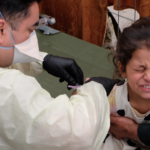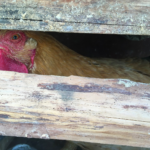Making sense of the Haitian cholera disaster
By Laura H. Kahn | November 23, 2010
On January 12, 2010, Haiti, one of the world’s poorest nations, suffered a 7.0 earthquake that killed hundreds of thousands of people, flattened the government (literally), and destroyed the relief headquarters of the United Nations. Consequently, over a million people were left homeless and live in squalor without access to adequate hygiene, clean water, or food. And earlier this November, Hurricane Tomas only added to the devastation with widespread flooding. This setting was ripe for cholera, a deadly diarrheal disease, to rear its ugly head. And sadly, that’s what happened.
Cholera is caused by the bacteria Vibrio cholerae. People only become aware of it when it causes disease in humans, but it is an aquatic microbe, found in rivers and estuaries, part of the ecology of brackish water, and associated with plankton and shellfish.
In 2009, the World Health Organization received accounts from 45 countries that reported over 220,000 cases of cholera and almost 5,000 consequent deaths. Haiti, which hasn’t had a case of cholera in a century, appears to be the latest country to be affected by the same pandemic that surfaced in Indonesia half a century ago. How exactly did the bacteria get introduced into Haitian populations? No one knows. But certainly drinking water contaminated by infected feces is a major risk factor. So if clean water, adequate sanitation, and sewage removal are available, then cholera is a completely preventable disease.
The disease can cause severe, profuse watery diarrhea and vomiting. And if left untreated, it can lead to circulatory collapse and shock, killing a victim within hours. Treatment is simple: fluid and salt rehydration.
In late October, the Center for Disease Control and Prevention (CDC) investigated hospitalized patients and found that two-thirds of the initial cholera victims lived or worked in rice fields in communities along Haiti’s Artibonite River. The majority of these individuals drank untreated water from the river before the illness began; 67 percent did not routinely drink chlorinated water, and almost 80 percent defecated outdoors.
The CDC also found a single bacterial strain in 14 stool specimens, which indicated that one event likely introduced the illness. This strain is indistinguishable from the outbreak strain in South Asia and elsewhere.
Perhaps due to this information, some Haitians are blaming UN peacekeepers with starting the epidemic and have started riots. Others, however, speculate that the upcoming presidential and parliamentary elections — to be held on November 28 — are fueling the violence. Given how weak and ineffectual Haitian President Rene Preval and the government have been, the level of anger and frustration boiling in the population is completely understandable. But continued violence will do no favors for Haitians: It will likely only increase the number of lives needlessly lost, while possibly deterring aid workers from coming to Haiti because of poor security.
I’ve previously written about how cholera is an indication of government failure, and the situation in Haiti is no exception.
So far, the death toll from cholera has surpassed 1,000 people. Over 18,000 have been hospitalized, and the disease is reportedly spreading to the Dominican Republic.
The government has failed. Now, it is up to the international community to provide the most basic of services such as clean water and sanitation.
Microbes don’t recognize political borders; they have spread around the globe for centuries. Cholera is no exception. It is counter-productive to blame individuals who are trying to help, and inciting violence will only aggravate this crisis.
The Haitians need to be educated on hygiene and sanitation and to seek medical care as soon as cholera symptoms develop. It took over a century for governments in developed countries to provide adequate sanitation and clean water to their citizens. Let’s hope that the Haitian government responds much more quickly.
Together, we make the world safer.
The Bulletin elevates expert voices above the noise. But as an independent nonprofit organization, our operations depend on the support of readers like you. Help us continue to deliver quality journalism that holds leaders accountable. Your support of our work at any level is important. In return, we promise our coverage will be understandable, influential, vigilant, solution-oriented, and fair-minded. Together we can make a difference.
Topics: Biosecurity, Columnists















